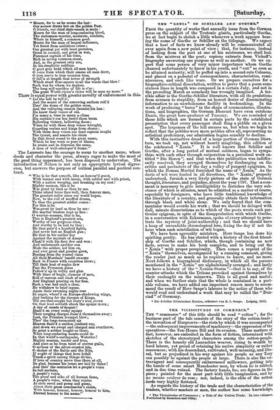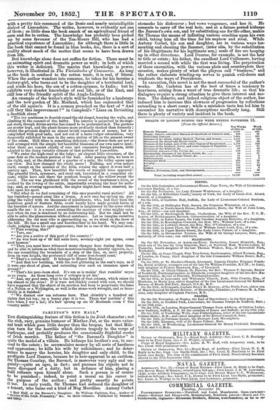TEE VICISSITUDES OF COMMERCE."
THE " commerce " of this title should be read " cotton" ; for the business part of the tale consists of the story of the cotton-trade : the invention of Ha.rgreave—the riots by which it was accompanied —the subsequent improvements of machinery—the oppression of the operatives—the Ten-Hours Bill and its evasion. These matters of fact, however, are embodied in the form of fiction, intermixed with sketches of the stereotyped characters among the cotton-people. There is the homely old Lancashire weaver, rising to wealth by hard labour, yet proud of retaining his native simplicity or rather coarseness; with his descendant, cultivated, well-meaning, and libe- ral, but as prejudiced in his way against his people as any Tory can possibly be against the people at large. There is also the.ex- fravagant and consequently embarrassed millowner, getting into the hands of some smart Manchester men, by whom b.e is robbed, and in due time ruined. The factory hands, too, are figures in the piece ; painted for the most part with little imagination, and by no means couleur de rose ; nor, indeed, is the elite of the cation -lords very highly flattered.
As regards the history of the trade and the characteristics of the traders, whether masters or men, the author has some knowledge,
• The Vicissitudes of Commerce ; a Talc of the Cotton Trade. In two Tolumes. Published by Saunders and Otley. with a pretty fair command of the Doric and nearly unintelligible dialect of Lancashire. The writer, however, is evidently not one of them ; as little does the book smack of an agricultural friend of corn and foe to cotton. The knowledge has probably been picked up by some favourer of the Ten-Holm Bill, who has had a practical experience of Lancashire ; for although there is little in the book that cannot be found in blue books, &a., there is a sort of reality about much of the matter that seems to have been drawn from life.
But knowledge alone does not suffice for fiction. There must be an animating' spiritand dramatic power air well in both of which this writer is deficient. The maxim that knowledge is power, however, is illustrated in The Vicissitudes of Commerce. As long as the book is confined to the cotton trade it is real, if literal. When the author wanders into romance, he takes' for his heroine a factory-girl, who turns out to be the daughter of a territorial lord, and sends his hero, the son of a cotton-spinner, to India but he exhibits very slender knowledge of real life, or of the East, and still less of the friendly spirit of the Anglo-Indians. An example of the writer's style will be furnished by a landscape and the new garden of Mr. Morland, which has superseded that of the old squire's. It is a sermon preached on the text of "And call they this improvement ? " in Campbell's "lines on. Revisiting a Scottish river."- "The ivy continues to flourish round the old chapel, burying the walls, and climbing to the summit of the belfry. The interior is preserved in its origi- nal state, though divine service has ceased to be performed in it. The gardens are neater kept, and the plant-houses more profusely stocked than formerly; whilst the grounds display an almost lavish expenditure of money, but ac- complished with good taste, and not out of a mere vulgar ostentation, very frequently exhibited by men in the same station of life as the present owner a the estate. Still there is something deficient,—the flower-beds are not so well arranged with the simple but beautiful blossoms of our own native land ; what there are consist chiefly of rare and expensive foreign plants, little adapted to the damp variable climate of that portion of Lancashire.
"We enter the high-road at the lodge; an elegant little structure, of the same date as the modern portion of the hall. After passing this, we turn to the right, and, at the distance of a quarter of a mile the valley opens upon our view. But how changed the whole scene ! Nailing, not even nature itself, except. on the summit of the hills, retains the aspect it wore half a century ago. Then, how beautiful the woods of mingled trees appeared ! The graceful birch, sycamore, and stout oak, luxuriated in a congenial cli- mate, whilst here and there the pendant boughs of the willow swept the brook. The ear was gladdened with the sound of the huntsman's horn, or soothed by the lowing of the cattle, impatiently awaiting the hour for milk- ing; and, as evening approached, the angler might have been observed, in- tent upon his sport.
"But what do we find remaining of this once peaceful rural picture ? All has vanished—passed away like a dream. A new race has sprung up, peo- plingthe valley with its thousands of inhabitants, who, had they been the malicious genii of Eastern fable, could hardly have made greater havoc of the beauties of nature. And the amazement is heightened by the noise which assails the ear : it is a sound resembling the murmur of some mighty cata- ract when its roar is deadened by an intervening hill. But we shall not be able to solve the pluenomenon without assistance. Let us imagine ourselves addressing the old man who is approaching us, as we stand on the brow of the hill. He has a small can and handkerchief in his hand. We may con- clude, .judging from his aged appearance, that he is one of the original stock. "'pine evening, this?'
"'Vero, sur.
"'Are you a native of this part of the country ?' " Au wur born up o' th' hill soide here, seventy-eight yer agone, come next kesmus.'
"'Then you must have witnessed many changes here during that time, and be able to inform us what that monstrouebuilding, directly opposite, is,— the one resembling the broadside of a ship of the line, or, more properly, from its vast height, the perforated cliff of some iron-bound coast.' "‘ That's a cotton-mill. It belongs to Messer Morland.' "'And that low building, with the roof glittering in the sun's rays, as if it were one sheet of glass, and extending over such an immense space of ground .? ' " 'That's his pare-loom shed. It's um as is makin' that rumblin' neyse as yo yearn. An thoos lung rows o' cottages is aw his.' "'And, my good man, what is the height of that column, which raises its top almost to the skies ? If it were not thickly coated with soot, we should have supposed that the object of its erection had been to perpetuate the fame of a Nelson or a Wellington, so well is the stone-work wrought, and so beau- tifully is it finished.' "'We dunnot can um columns here. That chimbly's a hundred, an' eighty feet tut top; un a bonny pipe it is too. There wer' nerthin' o' this here when I wer a lad; it's haw sprung up sin th' Morlands coon t' this country soide.' "



























 Previous page
Previous page